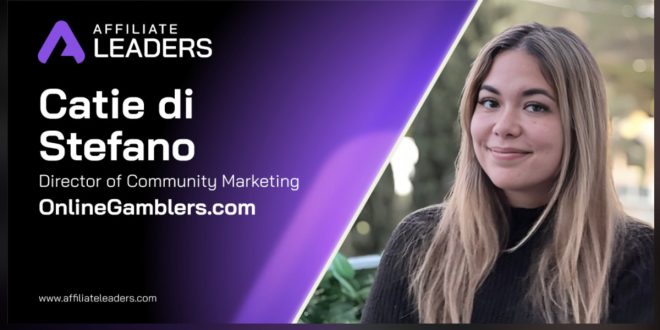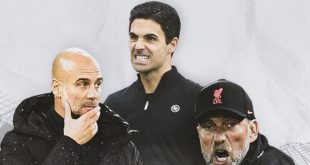With a population exceeding 380 million and encompassing 16.5% of the earth’s land area, the North American market emerges as a vast global arena brimming with potential.
Yet, across its 50 jurisdictions, each with its unique regulatory framework, navigating the North American market poses as many challenges as it does opportunities.
SBC’s Affiliate Leaders recently spoke with Catie Di Stefano, Director of Community Marketing at OnlineGamblers.com, ahead of her involvement at SBC Summit North America. Discussions centered around navigating the complexities of the US regulatory landscape, strategies for effectively utilizing alternative marketing channels, the significance of responsible gambling initiatives, and more.
SBC: Catie, thank you for agreeing to this interview. Online Gamblers is focused on the US market. What do you think are the biggest differences between the affiliate strategies in the US compared to the rest of the world?
Catie Di Stefano: First of all, thank you so much for having me here! It’s an honor to be officially part of the SBC family.
Although I have spent 13 years in the gambling industry and coming up to 6 years in the North American market, I’m fairly new to affiliation. We launched Online Gamblers 1.5 years ago, and my biggest shock as a US affiliate is the costs and complexity that come with affiliate licensing in the US.
The US market is very new, with iGaming launching in 2013 and online betting in 2018, so there is still an immaturity in the US market that affiliates need to take into consideration. For example, in the US It will take longer before you see results, way longer than in other markets; so it’s important to have the finance and patience in your strategy to last years before you see profits. Additionally, players are still not used to online gambling, and it will take a while before they are educated and ready to fully embrace digital. We will most likely see the next generation of gamblers before this maturity is reached.
We have already seen a couple of operators crash and burn in the US, by not considering this, and we will likely see some affiliates pull out of the US in the next few years as well because of too much spending.
After all, when we are talking about the US market, it’s really 50 different jurisdictions that have to be taken into consideration. At the point of this interview, we currently only have 39 jurisdictions that have launched sports betting, with North Carolina due to go live in a few weeks (March 2024). Additionally, California and Texas, two of the biggest states, are still yet to come.
Remember, we are only talking about betting at the moment, if we look at online casinos, the US has progressed in 6 states, and the rest are not there yet. The potential is endless in the US if done correctly and slowly!
Another thing to take into consideration is that each state also has its own requirements for licensing. There will be licensing fees and lawyer fees that you will never have seen in another market outside of the US. I think it’s good that they are careful with affiliates in the US, but keep in mind that affiliates will require background checks, fingerprints, and the whole nine yards to give you an affiliate license in some states. It’s not your average bedroom affiliate that can afford to enter this market. Affiliates in the US have to be ready to take on the legal and financial battle that is differentiated for each state, and the overall strategy has to include separate strategies for each state that an affiliate chooses to invest in.
On top of that, there are cultural differences between the states that a US affiliate has to consider. For example, the betting patterns of a player in Kentucky will be different from players who place bets in New York. I can go on and on about the US, but it’s something I’m really passionate about.
SBC: The US scene is more ‘limited,’ so to speak when it comes to operators that affiliates can promote. What challenges does this create for affiliates?
CDS: Yes, in terms of operators available per state, it’s very limited and it is mostly the same operators in all states. However, operators might have different campaigns, and sometimes even platforms and features available for different states, which creates a challenge for us as affiliates to keep track and redirect players to the right operator’s state review. One operator might have a dozen reviews, one per licensed state, and we have to review and market each of them individually as they’ll differ.
Operators in the US have tools like Geocomply to verify which state a player is in. But for us as affiliates, it’s a little bit more challenging because we don’t have that location information from our readers. There are often New York players that, for example, travel to New Jersey to play, but they might be wondering what the tax requirements are for New Yorkers who are gambling in New Jersey or Nevada. It’s a geography mess for a new affiliate like me!
The different states also differ in terms of what players are allowed to bet on. Some states don’t allow college betting, and some states allow college betting but not on the local team, so it’s a challenge to keep track of everything and make sure that the right information reaches the right player.
Authenticity is also a problem in the US, as licenses often don’t require that you have a certain logo or license number available on your site like you usually see with an MGA license and similar. Therefore, a lot of North American players can mistake illegal US operators for legitimate ones, as there aren’t a lot of other indications. That’s where we, as affiliates, come in and have a huge possibility of educating players on which operators are safe and legal.
SBC: In the US, besides licensing operators, a licensing regime is also often introduced for affiliates. In Europe, such discussions have often sparked reactions from the affiliate community. What do you think are the benefits/advantages as well as the disadvantages of this?
CDS: Personally, I think this is a good thing. Yes, licensing is complex and very expensive in the US, but I believe it’s creating a much safer market in the long term.
Let’s be honest, there are a lot of irresponsible affiliates out there who don’t care about the player’s well-being. As an advocate for responsible gambling, I believe affiliate licensing can help filter out those immoral affiliates and therefore, minimize their exposure to black operators that prey on vulnerable players.
However, I also believe that it’s important that licensing fees, tax revenue, and other gambling incomes go toward local resources. For example, most states in the US allocate a certain percentage of their gambling revenues towards education, infrastructure, research on gambling problems, and other similar initiatives – so I think that’s great.
This is especially prevalent when looking at markets like Sweden, which have incredibly high operator taxes. They fine their licensed operators left and right without warning, and do nothing to fight the black market that is increasing at a rapid speed. And now Sweden is looking at potentially licensing affiliates… and my question is why? How will this help Sweden? Again, in the USA, I can understand because they justify the costs of licensing… but Sweden just wants the money and glory from affiliates, in my opinion, without actually working towards finding a solution to the problem. Being Swedish myself, this infuriates me, and I wish they would learn more from the US state licensing processes.
SBC: You folks at Online Gamblers (OG) have been doing a fantastic job utilizing alternative channels/platforms for self-promotion in the industry; I’ve seen the videos you create, big fan. How does this (self-branding) approach, often overlooked by affiliates, help you score deals and build trust with existing and potential clients?
CDS: A big thank you, that makes me so happy that you enjoy our videos! The self-branding has been great in terms of authenticity because now everyone in the industry knows who we are, what we are working on, and where we are going. It’s easy to find collaborations because the suppliers and operators who are interested can identify with our goals and personalities before we even meet.
Many affiliates in the industry suffer from scams and people trying to impersonate their brand on Skype. But for OnlineGamblers.com, it’s very obvious that it’s just me and Liga Tarasova (for those who didn’t know, our faces are on the front page). We are easily accessible, and with it being a small industry, most people who see us can verify that they know we are legit and hard-working people who are always ready for collaborations.
We also get a lot of tips and recommendations from our audience about what they want to see more of, and that gives us a push to learn more. It’s a win-win situation!
SBC: You are moderating a panel during the Player Protection Symposium that delves into proactively addressing responsible gambling concerns on the operator side, specifically examining the interplay of branding and Responsible Gambling . I’m curious to hear your thoughts on how this can be achieved on the affiliate side too?
CDS: I do believe it can be achieved on the affiliate side, and what’s more, I think all US affiliates must adopt this before the market matures.
From an operator perspective, 10 years ago, they didn’t have a source of wealth, geolocation tools, or the knowledge and research that we have today.
The same goes for affiliates; before we didn’t know how we affected players in terms of responsible gambling, but now we do. We have to take responsibility for educating players on safe gambling practices and identifying the signs of problem gambling.
I am a firm believer in proactive responsible gambling, which I think more affiliates should adopt too. Essentially, proactive responsible gambling encourages players to set limits before they make a deposit. Whether it’s a deposit limit, a loss limit, or a session limit – it’s important for players to identify what type of gambling experience they want to achieve. It’s easy for a player to lose track of time and spending, but with proactive responsible gambling, we can ensure that players take action to prevent the problem and the industry maintains sustainability.
SBC: You’re also speaking at the ‘Eating its young? Has iGaming really cannibalized the bricks-and-mortar gaming?’ panel. What are going to be the main talking points of this panel for you?
CDS: I will most likely be on the opposing team; I don’t think there is any reason to fear cannibalization in the US. The brick-and-mortar players are not the same type of players that we find playing online gambling. The demography is different, especially when you look at the rising online numbers in the states. But, there is a misconception among many that it’s cannibalization.
As I mentioned earlier in this interview, we will most likely see another generation of online gamblers that take the online US market to maturity. A generation interested in esports and sweepstakes casinos, who own crypto, work on-the-go from mobiles and consume knowledge from videos on social media. That’s not your average brick-and-mortar player.
SBC: Do you have any forecasts for the future state of the industry in the US? What are the things or trends that affiliate businesses are expecting in the near future?
CDS: The US trend for 2024 is sweepstake casinos. Everyone is talking about it and how to get in on it. Most likely, we will see some stricter regulations coming into place for sweepstakes, but I’m expecting a big increase in interest from US players first.
As most of us know, sports betting is the entry to gambling for many players, but casinos are where we make our revenue. Therefore, I also think affiliates and businesses are expecting and preparing for the rise of online casinos in the US. With only 6 states currently offering iGaming, the future looks very bright in the land of freedom.
_________________________________________________________________________
Catie Di Stefano will feature as a moderator on the Player Protection Symposium conference panel ‘Conscious Commerce: The Interplay of Branding & RG’ which will take place on Tuesday, May 7, at 1.20 pm. Additionally, Stefano will also feature as a speaker on the panel ‘Eating its Young? Has iGaming Really Cannibalized Bricks-and-Mortar Gaming’ set to take place on Wednesday, May 8, the first core day of SBC Summit North America.









